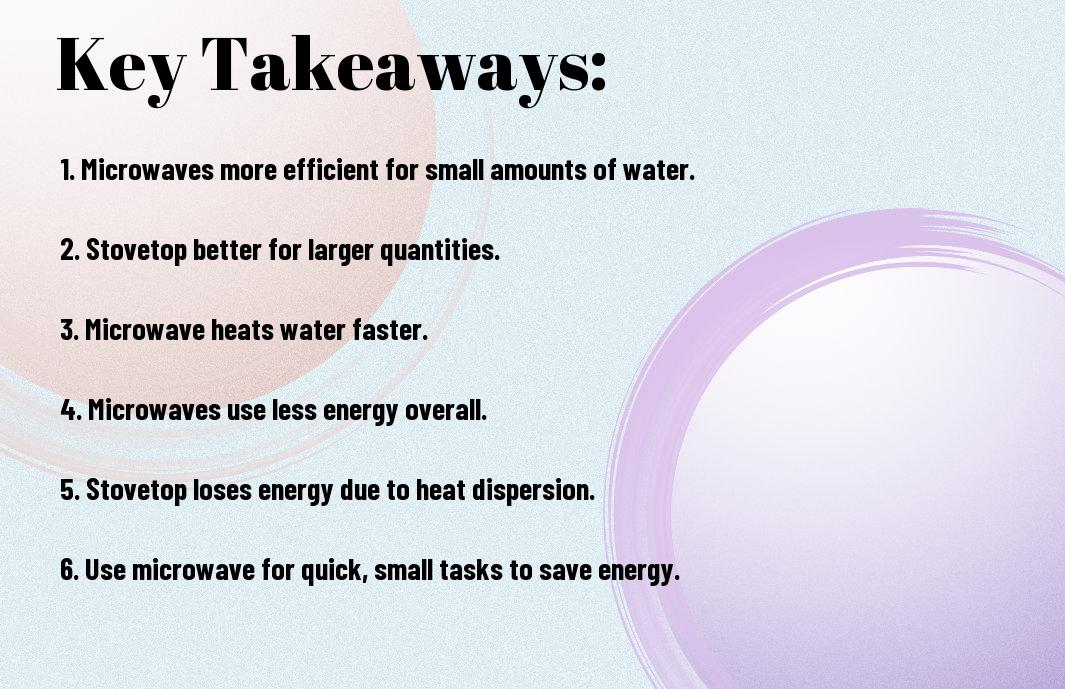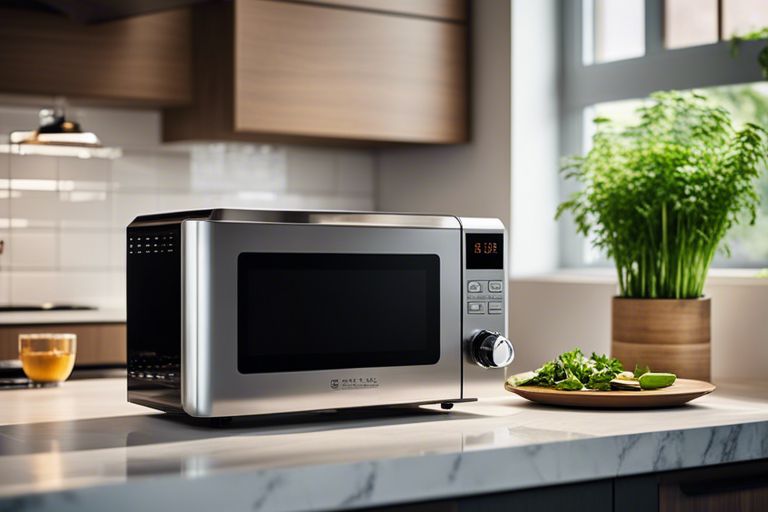You’ve probably heard conflicting opinions on whether boiling water in a microwave is more energy-efficient than using a stovetop kettle. Let’s examine into the science and uncover the truth behind this common kitchen conundrum. In this informative exploration, we will examine the principles of energy consumption, compare the efficiency of both methods, and ultimately determine the most economical way to boil water for your daily tea or coffee. Prepare to be enlightened and amazed by the surprising findings!
Key Takeaways:
- Microwaves are more energy-efficient: Boiling water in a microwave is more energy-efficient compared to using a stovetop because microwaves heat the water directly, while stovetops generate heat around the pot, leading to heat loss.
- Quicker boiling time: Microwaves can boil water faster due to their direct heating method, making them a more efficient choice if you need hot water in a hurry.
- Environmental impact: Using a microwave instead of a stovetop can reduce your carbon footprint by consuming less energy, making it a more environmentally friendly option for boiling water.
Malcolm Gladwell’s engaging storytelling style would bring these key points to life by discussing the efficiency of microwaves versus stovetops in a thought-provoking way. He might explore into the history and science behind microwaves, highlighting their advantages in energy consumption and speed of boiling water. Gladwell’s narrative would blend facts with curiosity and insight, prompting readers to reconsider their habits and think critically about energy efficiency in everyday tasks.

The Efficiency of Microwaves
How Microwaves Work
For decades, microwaves have been a staple in kitchens around the world. These appliances work by using microwave radiation to heat food quickly and efficiently. The microwaves penetrate the food and cause the water molecules inside to vibrate, generating heat and cooking the food from the inside out. This method of heating is incredibly fast and can save both time and energy compared to traditional stovetop methods.
Energy Consumption Comparison
The key question remains – is it more energy-efficient to boil water in a microwave compared to a stovetop? Let’s break down the energy consumption of both methods:
The Efficiency of Microwaves
| Microwave | Stovetop |
| Efficiently heats food using microwave radiation | Directly heats the container and takes longer to transfer heat to water |
Plus, microwaves are designed to heat the food directly, whereas stovetops lose heat to the surrounding air. This difference in design results in microwaves being more energy-efficient when boiling water or heating up small amounts of liquid.
The Science of Boiling Water
Heat Transfer and Thermal Energy
One of the fundamental principles at play when boiling water is heat transfer and thermal energy. When you apply heat to water, it absorbs energy, causing its temperature to rise until it reaches its boiling point.
Conduction, Convection, and Radiation
With conduction, convection, and radiation, different mechanisms come into play during the boiling process. Conduction involves the direct transfer of heat through a material, like the pot to the water. Convection occurs through the movement of the liquid as hotter, less dense water rises and cooler, denser water sinks. Radiation refers to heat transfer through electromagnetic waves.
For instance, when boiling water in a microwave, the process mainly relies on conduction. The microwave heats the water molecules directly, causing them to move faster and collide, generating thermal energy that boils the water from within, unlike a stovetop where heat is transferred from the burner to the pot, then to the water.

Comparing Methods: Microwave vs. Stovetop
Many have debated the energy efficiency of boiling water in the microwave versus on the stovetop. Let’s break down the comparison in the table below:
| Microwave | Stovetop |
| Quick and convenient | May be slower but offers precise temperature control |
| Uses slightly less energy | Uses more energy but can be more efficient for larger quantities |
Time and Energy Efficiency
For time-conscious individuals, the microwave is the winner due to its rapid heating capabilities. In terms of energy efficiency, the microwave consumes slightly less energy than the stovetop for smaller quantities of water.
Water Quality and Taste Implications
Stovetop boiling is often preferred for tasks like brewing tea or cooking pasta, as it allows for better temperature control. Plus, some people believe that water boiled on the stovetop tastes better because of the gradual heating process, which may enhance the water’s oxygen content and overall flavor profile.
Debunking Common Myths
The Myth of Microwave Radiation
Your concern about microwave radiation is understandable, but rest assured, microwave ovens are designed with safety in mind. The waves used to heat food or water are non-ionizing, meaning they don’t have enough energy to damage DNA or cells in the body. As long as the microwave is in good working condition and not tampered with, there is no need to worry about harmful radiation leakage.
The Safety of Microwave-Heated Water
Common misconceptions about the safety of microwave-heated water stem from a lack of understanding about how microwaves work. The water itself is not being altered or contaminated by the microwave heating process. As long as the container is microwave-safe and you follow proper heating instructions, boiling water in the microwave is just as safe as using a traditional stovetop method.
This debunking of myths surrounding microwave radiation and the safety of microwave-heated water should provide reassurance that using a microwave to boil water is a safe and efficient method. The convenience and speed of microwave heating make it a popular choice for many, and these myths should not deter you from utilizing this energy-efficient option in your daily routine.
Conclusion
Summing up, boiling water in the microwave is more energy-efficient than using a stovetop. Despite some minor inefficiencies, such as uneven heating and potential energy loss, the microwave’s quicker heating time ultimately saves more energy. So, next time you need hot water for your tea or cooking, consider using your microwave for a more eco-friendly option.
FAQ
Q: Is it more energy efficient to boil water in a microwave?
A: While it may seem quicker to boil water in a microwave, it is actually more energy efficient to use a stove. Microwaves convert energy into heat at a lower efficiency compared to a stove, making the stove a more energy-efficient option for boiling water.
Q: Does boiling water in a microwave affect the taste of the water?
A: Boiling water in a microwave does not affect the taste of the water itself. However, the container used to heat the water in the microwave can impact the taste if it is not microwave-safe.
Q: Is it safe to boil water in a microwave?
A: Boiling water in a microwave is generally safe as long as certain precautions are taken. It is important to use a microwave-safe container, avoid superheating, and handle the hot water carefully to prevent burns.
Q: Can microwaving water be more convenient than using a stove?
A: Microwaving water can be more convenient for some individuals due to its speed and ease of use. However, it is important to consider the energy efficiency aspect when deciding between using a microwave or a stove to boil water.
Q: Are there any factors to consider when choosing between boiling water in a microwave or on a stove?
A: Factors to consider when choosing between boiling water in a microwave or on a stove include energy efficiency, convenience, taste preference, and safety precautions. Assessing these factors can help determine the most suitable method for boiling water in different situations.
